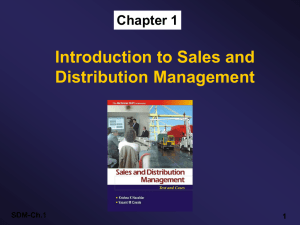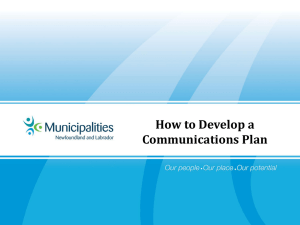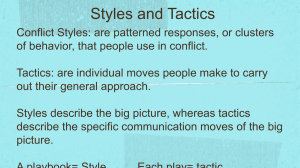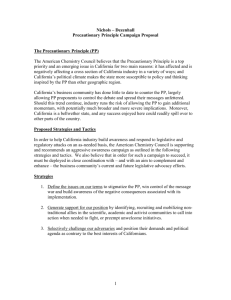Fundamentals of Education Organizing
advertisement
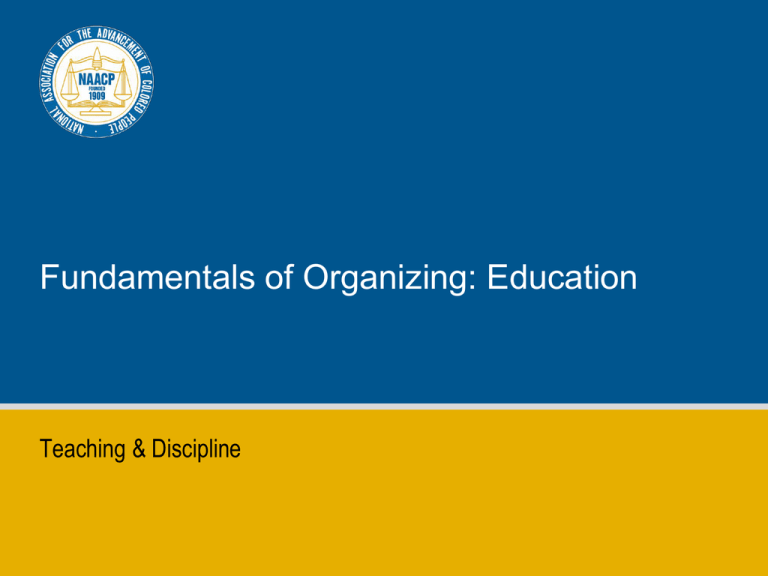
Fundamentals of Organizing: Education Teaching & Discipline Forms of Organizing Accepts existing power relationships Challenges existing power relationships 2 Direct Action Organizing Wins real improvements in people’s lives Makes people aware of their own power Alters the relationships of Power NAACP version attacks structural racism Decision-makers factor NAACP in beforehand 3 Dual Forms of Bias Individual Bias Institutional Bias A teacher who says, “There’s no way your son could have written that essay.” A policy that doesn’t offer advanced placement courses at a predominantly Black school., because, “Those students will never use that kind of knowledge.” 4 Speaking truth to power • Self Help • Education • Advocacy • Direct Action • Education Institutional Bias Individual Bias • Direct Service • Advocacy • Direct Action 5 Our Goals Put theory into action! Attack institutional racism in education with a national campaign for Excellence & Equity A campaign is a sustained plan for change using strategies that impact our issues. Identify issues in agenda Identify promising strategies Apply known tactics to each strategy 6 Our Issue Agenda Improving Teaching Improving Discipline Increasing Resource Equity Ensuring College & Career Readiness * All applied to turnaround schools 7 Our request – Each unit/branch picks one Participate in the Campaign for Equity & Excellence by: Adopting (at least) one issue area in education Committing to (at least) one strategy Targeting turnaround schools Applying tactics that fit your community Working to perfect our education organizing capacity 8 FOCUS ON TEACHING FOCUS ON TEACHING 9 Teachers who close the achievement gap 1. fully prepared when they entered teaching, 2. had taught for more than two years, 3. certified in field &/or by National Board 10 Strategies to improve teaching Strategies: Stronger, More Diverse Pipeline (preparation) • Tactics: ID future teachers, TEACH grants, residencies More Mentoring & Coaching (slows turnover) • Tactics: Lead Teacher, mentoring, new teacher supports More teachers with Advanced Certification (certification) • Tactics: Support for National certification, changes to state licensing 11 Local tactics by function & engagement Communications Education (Promote) (Sensitize, inform) Medium 1:1 meetings Engagement with journalists, newsletter articles, feature issue in a blog post Workshops, town halls, testing, monitoring data, conducting internal research and surveys Advocacy Direct Action (Influence (Grassroots decisionMobilization) makers/policy) Phone individuals, speak @ school and board of ed mtgs; advisory boards Hearings, panels, candidate surveys & scorecards 12 Putting it all together – medium engagement Branches with a medium interest in advanced certification Arrange a local media profile (communications) Conduct & share a survey of teachers(education) Form an advisory board (advocacy) Hold a scorecard rally(direct action) 13 Putting it all together – escalating tactics Branches interested in strengthening & diversifying the teacher pipeline could: Distribute information about TEACH grants (low, education) Appeal to the school board for incentives (med, advocacy) Raise funds & challenge board to supplement TEACH grants (high, direct action) 14 Strategy Chart Constituents, Allies and Opponents’ Targets Tactics Constituents = those directly affected by the issue; folks we can get to do things for us Primary Target = has what you want & wouldn’t otherwise give it to you Always an individual Educational = target needs info on facts, situation or impacts Allies = supporters, sympathizers; extra strength Secondary Target = has power over target but we have power over them Use only if primary won’t budget Power= target needs motivation by threat, fear of losing something Must go outside their experience & get their attention Opponents = those who’ll actively organize against us; recognize and move on; can be moved to allies 15 Wrap-up Group Q debrief &A Evaluation 16 Thanks for participating! tbethglenn@naacpnet.org 410-580-5104 (direct) 410-358-3385 (fax)


